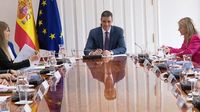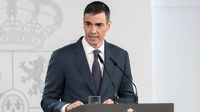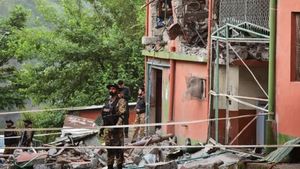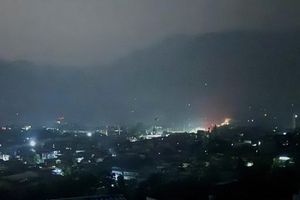On Tuesday, April 29, 2025, Spain's Prime Minister Pedro Sánchez presided over an urgent meeting of the National Security Council at La Moncloa, following a massive power outage that affected the entire country the previous day. The blackout, which lasted for over 20 hours in some areas, resulted in five fatalities and caused more than 1,000 million euros in losses.
As the gravity of the situation loomed, Sánchez was caught on an open microphone jokingly asking his ministers, "¿Con cebolla o sin cebolla?" (with onion or without onion?), a reference to the classic debate over tortilla de patatas, a popular Spanish dish. This light-hearted inquiry, made just before the meeting commenced, sparked outrage among many citizens who felt that such levity was inappropriate given the circumstances.
The power outage began around 12:30 PM on April 28, plunging the nation into darkness and cutting off internet access for many. Essential services were disrupted, and communication became nearly impossible for a significant portion of the population. Many citizens were unaware of the government's ongoing crisis meetings until communications were restored the following day.
Footage of Sánchez's jovial remark, which was part of a 32-second video shared by La Moncloa, quickly went viral, drawing mixed reactions across social media. While some defended the Prime Minister's comment as an attempt to lighten the mood before addressing a serious issue, others criticized it as a sign of insensitivity during a time of national crisis.
The informal atmosphere of the meeting was captured as ministers gathered in a relaxed setting, typically seen before the start of more serious discussions. The video showed Sánchez interacting casually with his cabinet members, including Second Vice President Yolanda Díaz, who responded "sin" (without) when asked about her preference for the tortilla.
This incident has reignited debates about leadership and communication during crises. Critics argue that Sánchez's humor was ill-timed, especially as many families were grappling with the aftermath of the blackout. The stark contrast between the light-hearted banter and the dire situation has led to public outcry, with many expressing their discontent on platforms like Twitter.
Historically, the tortilla de patatas has been a culinary symbol of national pride and a topic of spirited debate among Spaniards. The question of whether to include onion in the dish has long divided opinions, making Sánchez's comment not only a humorous quip but also a nod to a cultural touchstone.
Despite the backlash, some observers have suggested that moments of levity can be beneficial during tense situations. They argue that humor can serve as a coping mechanism, helping to ease the stress of leaders and citizens alike. However, the appropriateness of such humor in the face of tragedy remains a contentious topic.
The National Security Council meeting, which was convened to address the blackout, included key figures such as the heads of Spain's defense and intelligence services. King Felipe VI had presided over an earlier meeting that morning but was not present for this session.
As the power was gradually restored overnight, many services, including transportation, faced challenges in resuming normal operations. The government is now under pressure to investigate the causes of the blackout and ensure that such a situation does not occur again.
In the aftermath, the incident has prompted discussions about the responsibilities of leaders during crises and the impact of their words and actions. As Spain continues to recover from this unprecedented event, the question of how to balance seriousness with humanity in leadership remains at the forefront of public discourse.
In conclusion, while humor can sometimes serve to humanize leaders, it is crucial for those in power to remain sensitive to the contexts in which they speak. The reactions to Sánchez's light-hearted comment serve as a reminder of the public's expectations for seriousness during times of crisis.





